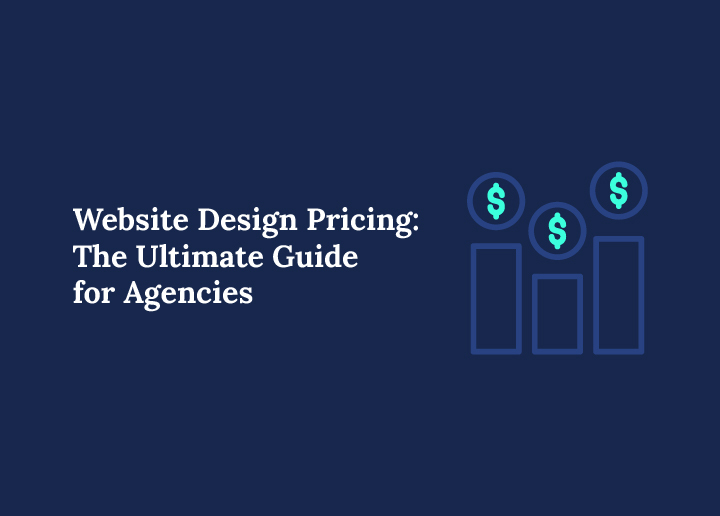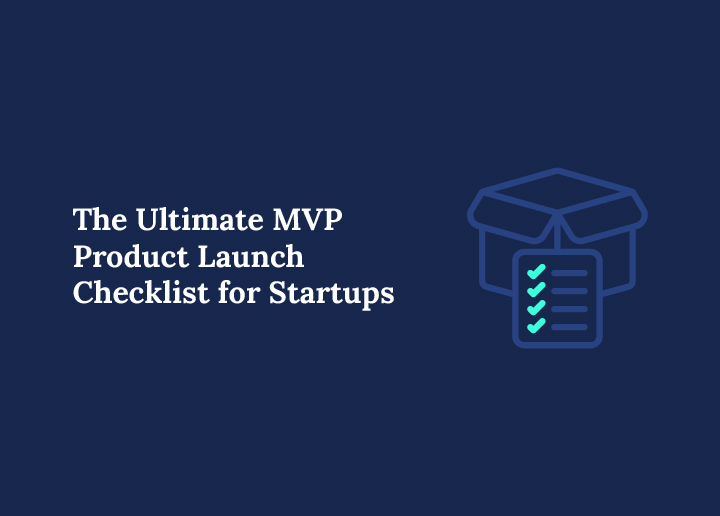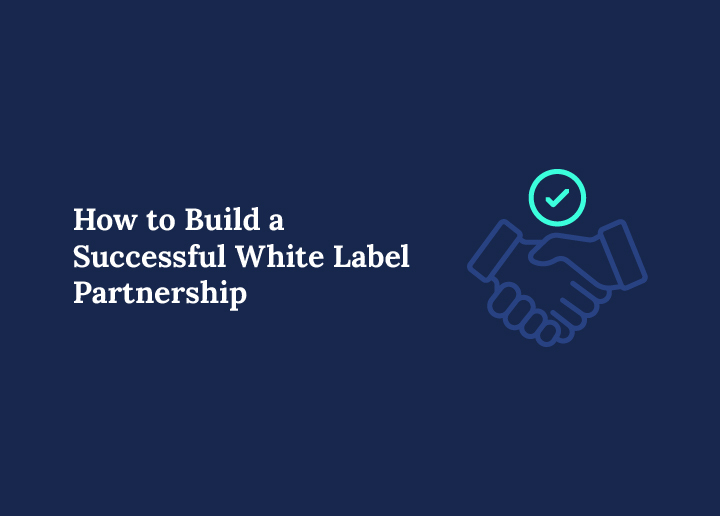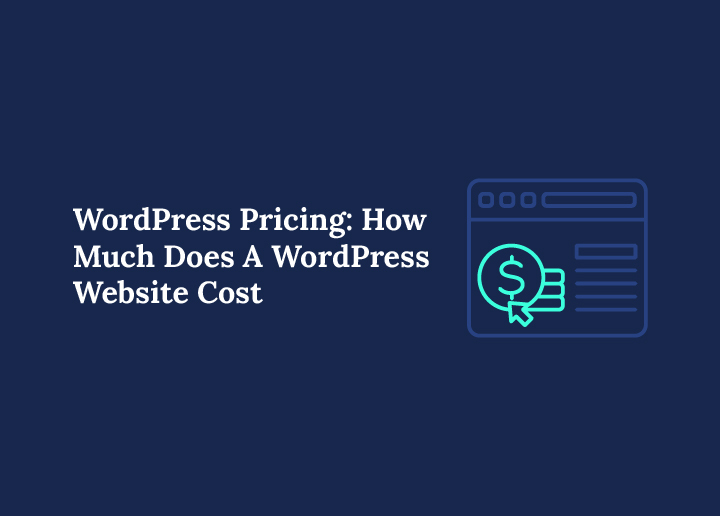Understanding website design pricing is important for agencies looking to outsource their projects. The cost of website design can vary depending on several factors, including the type of website, the level of expertise required, and the project’s timeline.
For instance, Seahawk offers comprehensive Pro WordPress services for agencies, covering website design, development, and maintenance at competitive rates, ensuring accessibility for agencies of all sizes.
This guide aims to explain the different factors affecting web design pricing, making it easier for you to understand the costs involved.
Whether you’re a small or large agency, this overview will help you make informed decisions when setting your budget for website design projects so you can make a profit.
Why Website Design Pricing Varies Across Agencies?
To begin with, it’s important to understand that no two agencies price their website design services the same way and for good reason. Several key factors contribute to this variation.
Firstly, the experience and expertise of the agency play a major role. A well-established agency with a strong portfolio and proven results typically charges more than a newer or less-experienced one.
Secondly, location impacts pricing; agencies in metropolitan areas or countries with a higher cost of living often have higher rates compared to those in smaller markets or offshore regions.
Additionally, the scope of services offered can cause significant price differences. Some agencies provide full-service solutions, including branding, SEO, content writing, and post-launch support, while others focus solely on design and development.
The target client base also matters; agencies serving enterprise clients tend to offer more complex, customized solutions that command premium pricing.
In essence, website design pricing isn’t one-size-fits-all. It reflects the agency’s value proposition, operational costs, and the level of service delivered. Understanding these variables helps clients make informed decisions and helps agencies confidently justify their pricing.
Know more: UI UX Design Services for SaaS Products
Factors Influencing Website Design Pricing
As an agency, determining the right pricing for website design projects is crucial for ensuring profitability, especially when outsourcing to third-party providers.

Several factors influence pricing, and understanding them will help you set competitive prices while maintaining a good profit margin even for complex web applications.
Below are the key factors for pricing strategy that you must consider when pricing your website design services.
Client Requirements and Project Scope: Website design pricing is primarily influenced by the client’s specific needs and the project’s overall scope. If the project is large and the requirements are extensive, it will require more resources and time, which can lead to higher costs.
Complexity of Design and Functionality: Following the project scope, the complexity of the design and the functionalities required can further influence the price. Advanced features like custom backgrounds, mega menus, or Lottie animations demand additional expertise and time, thus raising costs.
Design Customization: The level of design customization also impacts pricing. Custom website designs with interactive features are more time-consuming and creative-intensive than using standard template based design, which can increase the overall cost.
Timeframe and Deadlines: Another key factor is the project’s timeframe and deadlines. Urgent projects with tight deadlines can incur higher costs due to the need for extended work hours or extra resources to meet the schedule.
Level of Expertise: Finally, the expertise of the web designers involved affects the price. Senior designers with advanced skills charge higher fees compared to junior or mid-level designers.
Know more: How to Quote a Website Design or Development Project
Get an Estimate for Your Client’s Web Design Project
Contact us now to get a quote and take advantage of our special discounts exclusively for agency projects.
Different Pricing Models in Website Design
Website design outsourcing agencies use various pricing models. The cost of design services can also be influenced by geographical location, leading to price variations even within the same country. However, the rise of remote work allows agencies to access talent in more affordable regions, potentially lowering costs.
Seahawk has a large team based in India that serves customers globally across various time zones. We recruit the best talents from across the Indian regions. Our talent pool also includes individuals from the US, UK, Africa, and other locations. Further, the Seahawk Design Network in Poland is far above the competition.
While most other agencies typically specialize in one area of focus, Seahawk has built incredible case studies across all market segments over the years. Our versatility, global presence, and productized services enable us to provide solutions for every industry at revolutionary prices.
Outsourcing agencies offer various pricing models to their partners, which include:
Hourly Rate
Partners can opt for an hourly rate model, where they are charged based on the actual time spent on the project. This offers flexibility, especially for projects with evolving requirements or uncertain scopes.
Monthly Rate
Alternatively, agencies may provide a monthly rate option, allowing partners to pay a monthly fee for ongoing services. This ensures predictability in expenses and is suitable for long-term projects or continuous support.
Flat Rate/Fixed Fee
Some partners may prefer a flat rate or fixed fee model for projects with well-defined scopes and timelines. This involves paying a single upfront price for the entire project, providing cost clarity and transparency.
Seahawk’s WordPress website design, for example, starts at a one-time fee of $999 and offers a comprehensive package of features.
This includes bespoke homepage design, templated subpages, WordPress setup, blog setup, contact forms, responsive design, search engine optimization, and more.
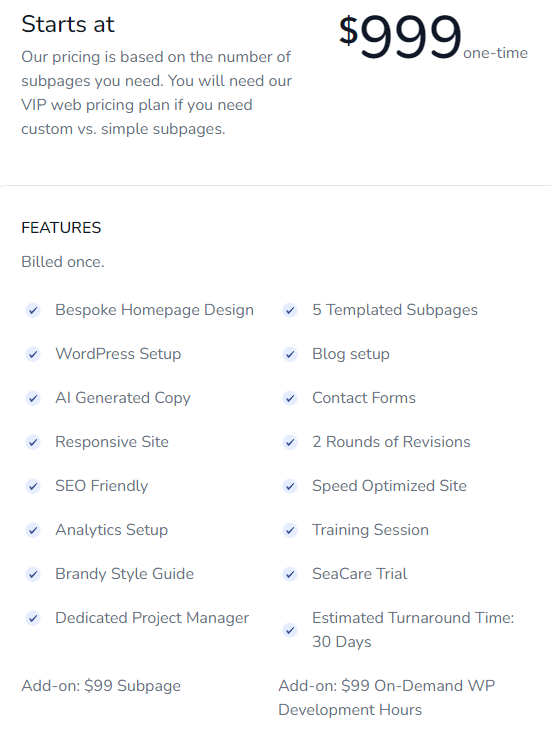
This package also includes two rounds of revisions, a training session, a brand style guide, SeaCare trial, and a dedicated project manager.
For custom subpages, Seahawk charges an additional $99 per subpage. Whereas, on-demand WordPress development hours are also available as add-ons for customization needs.
Retainer Agreements
Some agencies offer retainer agreements, where partners pay a recurring fee to secure a certain level of service or a set number of hours each month. This fosters long-term relationships and ensures dedicated support when needed.
Package Pricing
Lastly, package pricing involves offering predefined bundles of services (including services beyond design) at set prices. This simplifies the decision-making process for partners by providing clear options based on their needs and budget constraints.
Know more: Best White Label Website Design Agencies
Web Design Pricing for Different Types of Websites
Website design pricing varies depending on the type of website your client desires to create. As an agency, it’s important to grasp how web design outsourcing costs differ for different types of websites. This understanding enables you to provide accurate quotes to your clients.

Outsourcing agencies offer tailored pricing for various types of websites to accommodate the unique design needs of their partners.
Also Read: How to Migrate from Drupal to WordPress: Complete Guide
Small Businesses and Startups
Agencies may provide cost-effective solutions for small businesses and startups, focusing on essential website features and functionality within their budget.
Medium-sized Companies
Medium-sized companies may require websites with advanced features and customization to support their growing operations. Here, agencies can offer scalable solutions to meet their evolving needs.
Large Enterprises
Large enterprises often demand high-end, custom-designed websites with extensive functionalities and integrations. Agencies can provide bespoke services and support for these clients.
Learn more about: Best Enterprise WordPress Development Companies
eCommerce Sites
These ventures require specialized websites optimized for selling products or services online. Agencies can offer eCommerce-specific solutions like WooCommerce development along with features like payment gateways, specialized ecommerce functionality, responsive design, minor design tweaks etc. for enhance user experience.
Also read: How to Start an Online Store
Nonprofit Organizations
These organizations may require websites that prioritize storytelling, donation functionality, and volunteer engagement. Agencies can offer discounted or pro bono services to support the missions of nonprofit organizations.
Related: How to Build a WordPress Website for a Nonprofit Organization
Educational Institutions
Educational institutions, such as schools, colleges, and universities, need websites that cater to students, faculty, and administrators. These websites require features like course listings, event calendars, and student portals. Agencies can provide tailored solutions to meet the unique needs of the education sector.
Thanks to our collaboration with Academy LMS Pro and LearnDash, Seahawk can assist you in creating a professional, technologically advanced website tailored to educational institutes or e-learning platforms.
Government Agencies
Government agencies require websites that comply with accessibility standards, security regulations, and government policies. Agencies can offer specialized services to governments and legal entities, ensuring they meet compliance and the public sector’s unique requirements.
Learn more: accessiBe Review: Best Solution for Web Accessibility and ADA Compliance
Health and Medical Organizations
Health and medical organizations require websites that prioritize patient privacy and data security while providing essential information and services. Agencies can offer HIPAA-compliant solutions along with necessary features like secure patient portals, appointment scheduling, and telemedicine integrations.
Further reading: Best Website Design Practices for Healthcare Websites
Types of Website Design Services
One of the reasons why top agencies and web hosts prefer partnering with Seahawk is our comprehensive suite of services, all available under one roof. We also go the extra mile by providing customized solutions when required.
To this end, by partnering with us, agencies gain access to various types of website design services tailored to their clients’ specific needs.
Basic Website Design: These design services focus on creating simple, yet functional websites with essential features. These designs are suitable for small business website or startups.
Advanced Web Design: These web design services offer more sophisticated layouts and functionalities, catering to medium to large enterprises with specific branding requirements.
Custom Website Design:Bespoke website design services provide fully tailored solutions to match the unique branding and requirements of each client.
eCommerce Website Design: These design services specialize in creating optimized online stores.
Read: Website Design Guide for Professional Web Designers
Additional Services and Their Pricing
Partnering with an agency like Seahawk provides dual benefits along with proven track record. These extend beyond website design to include web development services, maintenance, SEO, and content creation.
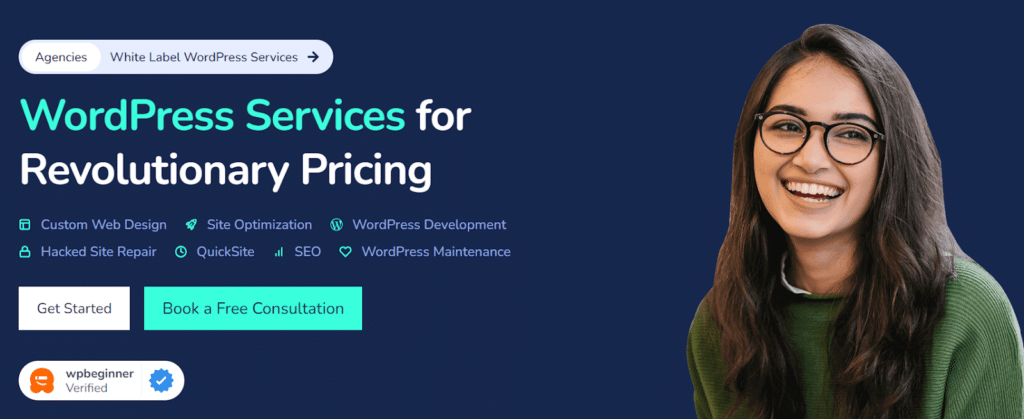
Seahawk also offers specialized services such as:
| Specialized Service | Description | Pricing |
| Hacked Site Repair | Comprehensive repair of hacked websites, malware removal, and cleanup | Starts at $299/billed once |
| Site Optimization | Site speed optimization to enhance website performance | Starts at $499/billed once |
| Site Migration | Customized migration of websites to new hosting | Custom quote |
| 24/7 WordPress Support | Round-the-clock assistance for WordPress websites, addressing both small and major issues | Starts at $129/billed hourly |
| WordPress Rebuild Service | This service facilitates the transformation of outdated websites into modern, high-performance platforms | $499/one-time |
| WordPress Quicksite Service | Seahawk is the ONLY agency offering this service, delivering fully designed websites in under a week | $699/one-time |
Moreover, Seahawk goes beyond traditional services by offering WordPress conversion services, such as:
- Figma to WordPress – $499/billed once
- XD to WordPress
- HTML to WordPress
- Sketch to WordPress
- PSD to WordPress
- Figma to BoldGrid
- Sitecore to WordPress
- Drupal to WordPress
Freelancer vs Agency Pricing: What’s the Difference?
Let’s compare the design costs and differences of freelancers and agencies. While freelancers typically offer lower rates, agencies provide comprehensive services, project management, and long-term support, justifying a higher price point.
| Criteria | Freelancer | Web Design Company / Agency |
| Web Design Cost | Freelancers typically offer a lower web design cost, ideal for startups or businesses seeking a basic online presence. | A web design company usually charges higher fees due to a broader service scope and added value. |
| Services Offered | Freelancers often focus on specific aspects of the web design process, such as layout or graphics. | Agencies handle the entire web design process, including strategy, branding, development, and SEO. |
| Project Scope | Suitable for small website design projects or limited-scope tasks. | Ideal for complex website projects requiring a team-based approach and long-term support. |
| Pricing Structure | Freelancers use flexible pricing models, often charging hourly or per project. | A web design firm typically offers structured pricing models or packages based on project size and complexity. |
| Project Management | Project management is usually self-handled by the client or the freelancer. | Agencies have dedicated project managers to oversee the website design project from start to finish. |
| Design Quality | Design quality can vary based on experience; may lack consistency or mobile optimization. | Agencies provide a consistent, user-tested design process with attention to mobile optimization and UI/UX. |
| Customization Level | Freelancers can deliver custom design work, though often within limited constraints. | Agencies provide a fully custom website tailored to business goals and target audience needs. |
| Technical Expertise | Some freelancers offer web development, but capabilities may be limited to content management system (CMS) or website builder tools. | Agencies offer comprehensive web development, including custom web applications and technical integrations. |
| Digital Marketing & SEO | May offer basic digital marketing services or search engine optimization if skilled in those areas. | Agencies often include SEO, landing pages, and digital marketing strategies within their pricing model. |
| Support & Maintenance | Ongoing support is usually limited or paid separately. | Agencies often include post-launch support and maintenance as part of their pricing structure. |
| Scalability | Best suited for individuals or small businesses with modest scalability needs or basic site with clearly defined scope. | Web design agency pricing is designed to support scaling and evolving website needs over time. |
| Most Common Pricing Models | Hourly or fixed project based pricing are common pricing models for freelancers | Agencies adopt layered pricing models based on service tiers, milestones, and deliverables. |
How to Justify Your Agency’s Website Design Pricing to Clients?
When presenting your agency’s website design pricing to clients, transparency and communication are key to building trust. Clients want to understand not just what they are paying for, but why it costs that much.
Start by breaking down your pricing structure and aligning each element with specific deliverables, such as custom web design, mobile optimization, user interface development, or integrated SEO strategies.
Explain how your design process contributes to achieving their business goals, whether it’s generating more leads through optimized landing pages or improving brand credibility with a fully custom website.
You can also highlight the long-term value of working with a professional web designer or a full-service web design company that provides strategy, execution, and post-launch support.
Moreover, compare your pricing model with common pricing models in the industry to emphasize competitive value. If applicable, showcase client success stories or data that connects your services to measurable results.
Ultimately, clients are more likely to invest when they see your pricing not as a cost, but as a strategic move to enhance their website project and overall digital presence.
Check out: Latest Trends in Website UI/UX Design Services
Value-Based Pricing: Charging for Outcomes, Not Hours
Instead of simply billing for time, more agencies today are adopting value-based pricing models that align their fees with the outcomes they deliver.
This approach shifts the focus from the number of design or development hours to the actual business impact of the website design project, such as increased conversion rates, improved lead generation, or enhanced user engagement.
By pricing based on value, a web design agency can better position itself as a strategic partner rather than just a service provider. This model is especially effective for projects involving custom web design, digital marketing integration, or custom web applications, where the return on investment (ROI) can be clearly measured.
Clients are more likely to accept higher costs when they understand how your work directly contributes to their goals, whether it’s building a high-converting landing page, enhancing their search engine optimization, or delivering a seamless user interface that drives sales.
In short, value-based pricing not only increases profit potential but also strengthens your agency’s credibility and client relationships by focusing on what truly matters: results.
Read: How to Start a Digital Agency
Bonus: How to Increase Profit Margins Without Losing Clients
Improving profit margins is essential for the sustainability of any web design company, but it doesn’t always require raising your prices significantly.
With the right strategies in place, you can optimize internal processes, boost revenue per client, and maintain strong relationships, all without compromising on service quality or driving clients away. Here’s how:
Streamline Your Web Design Process
To start, evaluate and refine your current design process. Standardizing project workflows, using project management tools, and templating repeatable tasks can reduce delivery time and cut unnecessary costs. This allows your team to focus on high-value tasks and complete more website design projects efficiently.
Offer Strategic Upsells and Add-Ons
Next, look for opportunities to increase the value of each client relationship. Offer relevant upsells such as search engine optimization, additional landing pages, blog content, or mobile optimization. These not only enhance the client’s final product but also add to your bottom line.
Implement Tiered Pricing Models
Instead of flat rates, consider implementing tiered pricing models or pricing structures. This gives clients the flexibility to choose a package that matches their budget while allowing you to offer higher-tier, higher-margin services such as custom web applications or fully custom websites.
Improve Client Onboarding and Communication
Strong communication leads to better expectations and fewer revisions. A smooth onboarding process and clear project milestones reduce misunderstandings, scope creep, and delays, ultimately saving time and boosting your profit margin.
Retain Clients Through Ongoing Services
Finally, think beyond the initial website project. Offer ongoing maintenance, support, or digital marketing retainers. Retaining clients through monthly recurring services ensures predictable revenue and maximizes the lifetime value of each account.
Expert Picks: Best WordPress Development Agencies
Final Thoughts
Knowing about website design pricing is vital for agencies seeking to outsource their web design projects.
By considering factors such as client requirements, project scope, and pricing models, agencies can set competitive web design rates while ensuring profitability.
Moreover, with the diverse range of website design services available, agencies can easily cater to a broad spectrum of client needs.
Seahawk, with its innovative solutions and commitment to excellence, is ideal for agencies seeking a reliable partner to scale their website design service. Our comprehensive services also make us the perfect choice for agencies of all sizes.
Web Design Pricing FAQs
How much should I charge to design a website?
The cost of designing a website varies. It is based on complexity, key features & functionality, and the expertise of the designer. On average, for a standard web design project, prices can range from a few hundred to thousand dollars.
How much does a 5-page website cost?
A 5-page website costs would be between $999 to $4,999, depending on design complexity, functionality requirements, and the designer’s rates. Prices may also vary significantly based on individual project specifications.
How much does a website redesign cost?
Unlike a new website, the cost of a website redesign depends on factors like the website’s size, the extent of changes needed, and the designer’s rates. Prices can range from a few hundred to several thousand dollars for a comprehensive redesign project.
What is the difference between a web designer and a web developer?
Web designers focus on a website’s visual and user experience aspects, including layout, color scheme, fonts, and typography. On the other hand, web developers are responsible for implementing the design using coding languages like HTML, CSS, and JavaScript to create functional websites.
Which is better – hiring freelance web designers or hiring an agency?
The choice between hiring a freelance web designer or a web design agency depends on your project requirements, budget, and preferences. Freelancers may offer more flexibility and cost-effectiveness for smaller projects, while agencies provide comprehensive services, expertise, and project management for larger, more complex projects.
